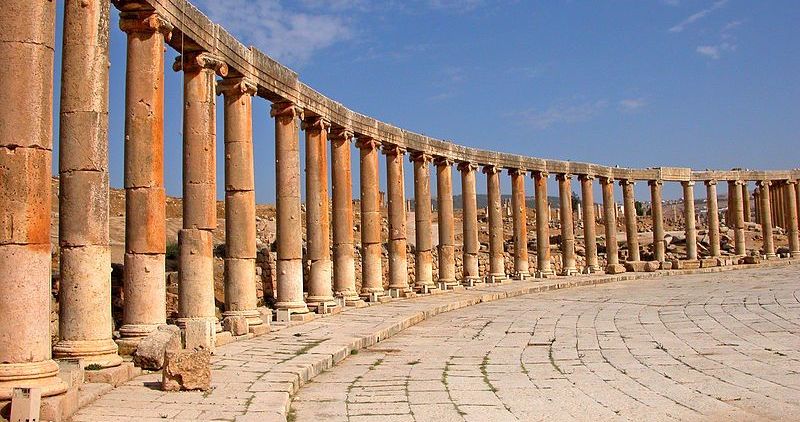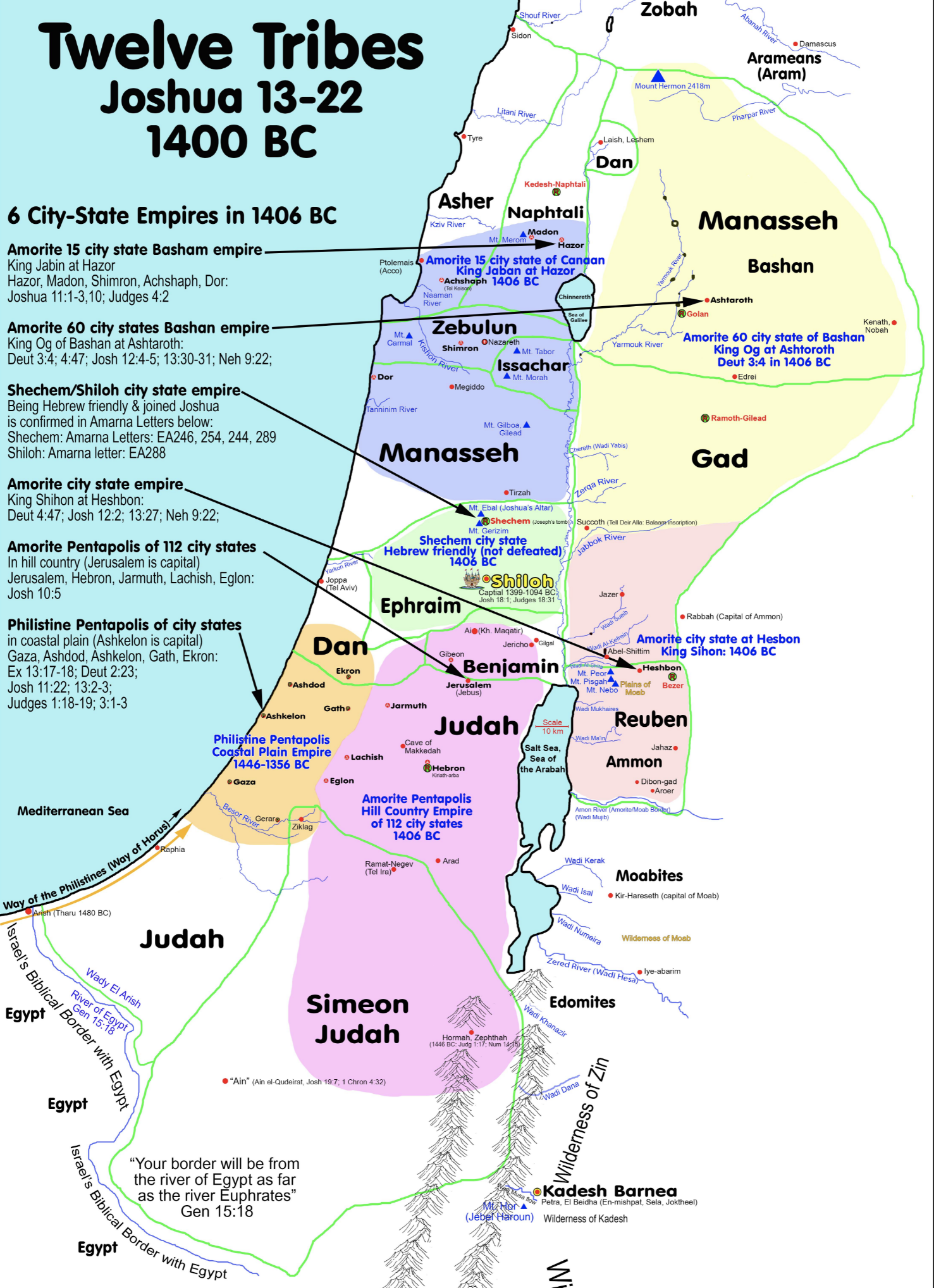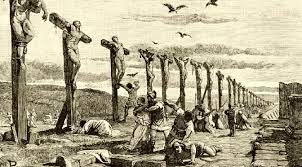
As Jesus sends His Apostles into the world, He sternly admonishes them to minister only to the Lost Tribes: "Do not go into the way of the Gentiles," He says, but go rather to the lost sheep of the house of Israel." (Mt 10:5-6)

A tempest arose at sea so great that the Disciples plead with Jesus:
| "Lord, save us! We are perishing!" (Mt 8:25) |
From here they sail as if through a "worm hole" into a lost land, an impossible geography. The third-century philosopher Porphyry of Tyre commented (Against the Christians), that there are no cemeteries on the shores of Lake Gennesaret (the Sea of Galilee); there are no tombs you could live in along the shore; there are no cliffs from which swine could leap into the sea. This controversy has followed us down to the present time.
The world they have arrived to in its moral essentials is one that resembles our own. Is our world not separated from God? Do people not commonly shoo God away even at the mention of His Name? And do we not suffer from demon possession? Like theirs, our world is a "culture of death," camped out, so to speak, around tombs. This is the crux of our Gospel lesson this morning: Jesus lands on a distant planet, as it were. It is the "Lost Planet": the world without God. And it holds a mirror up to our own world in a haunting, even menacing, image. But first let us understand the background for our Gospel lesson.

As Jesus sends His Apostles into the world, He sternly admonishes them to minister only to
the Lost Tribes:
"Do not go into the way of the Gentiles," He says, but go rather to the lost sheep
of the house of Israel."
(Mt 10:5-6)
Not going "into the way of the Gentiles," however, is not so easy. For the Ten Lost Tribes of Israel are lost not as coherent nations marching about under tribal banners. They have become lost, person by person, within the fabric of the Gentiles. (And we must remember that the term Gentile was nearly synonymous with immoral to devout Jews.) They have become acculturated to a different world, the Graeco-Roman world. Their cataclysm began in 723 B.C. with the conquest of the Neo-Assyrian Empire over the Northern Kingdom. But afterwards a whole world, conquered by Alexander the Great and later occupied by Roman Legions, became lost to the God of Abraham, Isaac, and Jacob, no longer living under God's commands nor walking in His holy ways. This was the nominal cause for which the Son of God was sent into the world: to save the lost sheep of the House of Israel.
The map of the Levant during the fifteenth-century B.C. depicts a thoroughly Hebrew world with Jacob's sons occupying countries with names like Judah, Reuben, and Gad, from the northern borders of Egypt in the South unto the frontiers of Syria in the North. By the first century A.D., however, the known world had became Greek — formed by Greek institutions, Greek customs, and Greek religion, much of it adopted by the Romans. Indeed, the entire lifeworld around Jesus spoke Greek, even in Rome where archaeologists have unearthed public monuments bearing Greek inscriptions. In Jerusalem, young Jewish men were educated according to the Greek forms of Paidea. Some would be sent to Rome to finish their education. Boys in Judea competed in Graeco-Roman sports such as wrestling oiling their unclothed bodies before the contest. Many sought to reverse their circumcisions, better to conform to Graeco-Roman culture.
Did these boys speak Hebrew? Some scholars speculate that their situation was much like our own. They attended Hebrew School, learned the alphabet and phonetic pronunciation, and memorized certain prayers such as the Shemah in preparation for their Bar Mitzvahs. Few lived in devout households. Even the religious upper-class, represented by the Sadducees, rejected supernatural aspects of the faith — angels, the resurrection of the dead — as beliefs unfit for the modern mind.
Josephus Flavius, whose intended audience were influential Romans, wrote only in Greek. Of great significance to us today, Jesus and His Apostles spoke to each other in Greek. For as Werner Jaeger pointed out sixty years ago (Early Christianity and Greek Paidea, 1961), Jesus does not quote from the Hebrew Bible when He cites Scripture, but rather from the Greek translation, the Septuagint (LXX). When the Apostles finally sought to make permanent what had been oral tradition only, they set down the Gospels and the Catholic Letters, not in Aramaic or in Hebrew, but in Greek — obviously, the language they all spoke to each other.

The world through which Jesus and His followers journeyed was a Graeco-Roman world.
In every passage in the New Testament,
we must picture them
as being strangers in a strange land.
Should you visit the Decapolis
—
Ten Cities in Greek
—
you will find ruins calling to mind Classical Antiquity,
not Hebrew civilization.
According to manuscripts of the Synoptic Gospels preceding Origen, the land Jesus visits in our Gospel lesson this morning is called the land of "the Gadarenes," seat of the Tribe of Gad. Following Origen, we find it revised to "the Gergasenes," reflecting the great influence this Ancient Father. As with Porphyry, who was roughly twenty years old at Origen's death, Origen and his contemporaries evidently sought a more plausible landscape for the story. Origen teaches elsewhere, however, that whenever you encounter the implausible in Holy Scripture, then you must understand that the Holy Spirit has invited you into into spiritual depths. We might respond, "This passage does not make any sense to my mind, but what does my soul have to say?" We must apply spiritual, not literal, interpretation.
Fulfilling the commission given Him by the Father, Jesus seeks out the lost Tribe of Gad, the Gadarenes. As ancient maps depict, the northern boundary of ancient Gad forms the south shore of the Sea of Galilee (Lake Gennesaret). We read in all Gospel accounts of this story that Jesus sailed to "the other side." Ancient Gad certainly is the polar of opposite of their base in Capernaum of Galilee, which fronts the north shore.
What the Son of God finds in the Land of Gad is a people thoroughly lost to His Father. They tend domesticated pigs. That is, they eat pork violating God's purity laws (kashrut), the minimal steps that every Jew takes toward a Nazirite vow. Judging from the protagonists of the story, theirs is a culture of death: for they live among tombs. They are in chains, evidently enslaved to an invisible master. And they are possessed by demons. In another account we learn that their name is Legion. That is, demons have taken over this world. They are without number. The evil one runs rampant in this field!
We have discussed invasion by foreign powers. We can say truly that Judea is possessed by Caesar. It is his possession. The analogy is precise, for every exercise of the Jewish will to resist this invading alien will be met by forceful counter-attack .... as the long history of Jewish rebellion attests.
In this we see the inner workings of demon possession: a spiritual entity, in this case the ideal of empire, which has morphed into a religion in Jesus' time, has taken over the Levant, the historic geography of God's chosen people. As with the Gadarene demoniac in chains (in St. Mark's Gospel, our earliest account), a military power holds the Jewish people in thrall. Significantly, the sect of Judaism called the Way would resist with its great leader, the Apostle Paul, writing
|
"And see, now I go bound in the spirit to Jerusalem, not knowing the things that will happen to me there,
except that the Holy Spirit testifies in every city, saying that chains and tribulations await me. (Acts 20:22-23) |
St. Paul resists foreshadowing generations of Christians who will refuse to repudiate Jesus upon pain of death and refuse to go along with pagan culture, which is everywhere around them. This is an important detail, for we see that even military possession must play out one soul at a time. In due course, the rest will fall: religion, culture, and finally our children, the upcoming generations.
A more insidious invader is moral in nature. To illustrate this word insidious, the Oxford dictionary says that "sexually transmitted diseases can be insidious and sometimes without symptoms." Actually, the most prevalent STD in the world is unsymptomatic. That is, a horrible, perhaps fatal, disease invades the body though we may not realize it at first. We have invited it by consent of the will. It takes over our central nervous system; it infects our spouse; it destroys our marriage and family depriving our children of a safe and secure home. It destroys everything in its path. Who opened the gate of this enclosed garden of marriage to let it in? Who breached the impenetrable stone wall built by God for our safety and security? It was all done by our consent.
Now, multiply this effect. Who consented to a whole world in which sexual promiscuity is accepted as normal, even healthy? I grow weary of hearing this comment in the broader culture: that somehow has a normal, healthy appetite for sex (outside marriage as most sex is). Who consented to the general demise of marriage? Who consented to pornography, once deemed demonic and banished by law? Who has accepted its presence on every newsstand and then later on every computer screen in every household? Who consented to disordered sexuality as a new standard for "family" life? I ask this question from the other direction: Who dares to dissent? The loss of a whole world to demon possession is accomplished through consent: one by one, block by block, neighborhood by neighborhood, until an entire culture is possessed, eventually destroying it.
The word possession might seem extreme to some. If so, they are living in a delusion. For our world is essentially moral and spiritual. It cannot be otherwise. God made it this way. We are either morally good, seeking to conform ourselves to God's Book of Life, or we are evil. There is no in-between. There is no neutral Switzerland in the moral domain.
We are either spiritually mindful, aware of the Holy Spirit's leading and teaching Presence, or we are carnal, constantly aware of our own animal needs and desires. Which one propels or leads us through life? Hour by hour, day by day, all of our lives .... which one? It depends on which one we consent to. Either we consent to the influence of angels, or we have consented to demons, for the most precious souls within us are avidly contested by either.
Our mistake is to marginalize demon possession and exorcism as an oddity — something that rarely happens .... if it happens at all. I read a few years ago that the Patriarchate of Rome, the Roman Catholic Church, has raised up more exorcists during the twenty-first century than at any previous time. It is not spoken of openly by the Roman Church, but evidently it is acted upon. Yet, we arrogantly attribute possession to primitive, pre-scientific beliefs as if the first-century did not know what disease was .... or, more important, as if demons do not surround us today.
Have you never met a man who just cannot stop drinking? Have you never met a woman who just cannot stop sleeping with men they barely know? Have you never known compulsive people who are no longer in control of their lives? Possession is all around us. And our laws and social rules have followed because possessed souls fear the loss of the "food" that their demons crave. Be sure of this: if the American people suddenly became indignant demanding an end to the pervasive indecency surrounding us, legislators would quickly line up fearing loss of elected office to pass new laws outlawing pornography, demanding that the courts review their position on what is to be considered indecent.
We are well aware of possession's inner mechanisms. Sadly, most of us are familiar with it. It begins with curiosity. We venture into the forbidden .... usually followed by revulsion and a troubled conscience. But repeated venturings all too soon silence the alarms of conscience. Soon, curiosity gives way to habit. Habit hardens into what we call addiction (the socially acceptable word for possession). Finally, vice hardens into viciousness, and the possessed soul becomes monstrous in appearance as the light of God that once radiated from a young and innocent face goes dim.

The Jewish people rebelled against the invading demon of imperial power
famously
under Herod the Great
in the year 4 B.C.
three miles from Nazareth
at a place called Sepphoris.
The Roman General Varus ordered an en masse crucifixion of 2,000 Jews
in a single day.
As if this heinous act were not enough,
Varus also had
the family of each condemned man
butchered at the foot of his cross in the sight of the dying rebel.
No symbol in all Jewry ever after was more hated than the cross. For which symbol could represent greater evil dwelling within the human heart and soul and possessing them? It would be this hated symbol upon which the Son of God would ascend touching the lives of these faithful Jews with Divine dignity. Is not the Crucifixion of our Lord and Savior Jesus Christ the ultimate exorcism, harrowing the House of All Demons?
God the Father sent His Son to order the world to Himself. For the Lost Sheep of Israel had become acculturated to their invaders. You see, that is how possession works: we glory in it. We just can't wait for our next "fix." The Gadarenes ate forbidden swine with relish. They consented to demonic possession. They lived unclean lives in a culture of death among tombs, pointing ahead, as only God can see, to eternal life in the House of Death with Satan and his demons.
Have you ever tried to help someone whose life is dominated by demonic impulse, whether alcohol, drugs, or forbidden sex? Like the Gadarenes, they say, "Go away! Leave me alone! This is none of your business! I have to do what I have to do! I don't want your help!" They will banish even God to have what is forbidden. And the Son of God replies (spoken shortly before His trip to Gad):
|
"Therefore whoever confesses Me before men, him I will also confess before My Father Who is in Heaven.
But whoever denies Me before men, him I will also deny before My Father Who is in Heaven. (Mt 10:32-33) |
In our essentially moral and spiritual world, there is no neutral position. Either we consent to God and His angels, or we deny Him. Either we are friends of God, or we are His enemies. With St. Gregory the Great, let us boldly and resolutely and truly say, "Be friends of God!" Let every one who sees us in the public square, at work, and among our family and friends know who, and Whose, we are. For vast legions of demons and the armies of God do battle in the night, in the night of our world. Either we are numbered with the angels — petitioning them for assistance, seeking them for guidance, and giving thanks for their protection — or we consent to possession by demons. And, before long, we will find ourselves saying, as so many, many Americans do,
| "What have we to do with Thee, Jesus, Thou Son of God?" |
In the Name of the Father and of the Son and of the Holy Ghost. Amen.